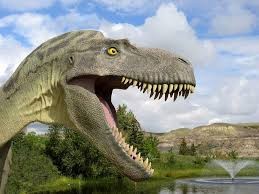By Dane Lorica, | January 03, 2017

A new study says that long incubation period for dinosaur eggs may have affected the species' survival. (Frank Maurer/CC BY-NC-SA 2.0)
A research on dinosaurs' fossilized teeth has revealed that non-avian dinos took three to six months to hatch their eggs.
The study by scientists from the American Museum of Natural History, Florida State University and the University of Calgary contradicts existing ideas that the incubation of dinosaur eggs is akin to avians. Mark Norell said, "we know very little about dinosaur embryology, yet it relates to so many aspects of development, life history, and evolution." He explained that technological advancements such as high-resolution microscopy and CT scanners helped them study the early development of dinosaurs.
Like Us on Facebook
The study published in the Proceedings of the National Academy of Sciences suggests that the long incubation period of eggs meant the extinct animal had difficulties in competing with other animals including mammals, reptiles, and avians.
The fossilized teeth of ornithischian embryos and Protoceratops were tested using a scanner followed by microscopy to examine the "von Ebner" lines which serve as an indicator of growth not only in animals but also in humans. Gregory Erickson said, "these are the lines that are laid down when any animal's teeth develops."
According to the results of the study, Protoceratops embryos were approximately three-months-old during their death while the embryos of Hypacrosaurus died during their sixth month. This suggests that birds have shorter incubation period than dinosaurs.
However, the scientists clarified that deeper analysis might be obtained by examining more "bird-like" dinos but unfortunately, available embryos are scarce. "Time within the egg is a crucial part of development with major biological ramifications, but is poorly understood because dinosaur embryos are rare," a co-author of the study, Darla Zelenitsky, said.
The scientists believe that the long period before a dinosaur egg hatches affected the survival of the species, "We suspect our findings have implications for understanding why dinosaurs went extinct at the end of the Cretaceous period, whereas amphibians, birds, mammals and other reptiles made it through and prospered," the researchers said.
-
Use of Coronavirus Pandemic Drones Raises Privacy Concerns: Drones Spread Fear, Local Officials Say

-
Coronavirus Hampers The Delivery Of Lockheed Martin F-35 Stealth Fighters For 2020

-
Instagram Speeds Up Plans to Add Account Memorialization Feature Due to COVID-19 Deaths

-
NASA: Perseverance Plans to Bring 'Mars Rock' to Earth in 2031

-
600 Dead And 3,000 In The Hospital as Iranians Believed Drinking High-Concentrations of Alcohol Can Cure The Coronavirus

-
600 Dead And 3,000 In The Hospital as Iranians Believed Drinking High-Concentrations of Alcohol Can Cure The Coronavirus

-
COVID-19: Doctors, Nurses Use Virtual Reality to Learn New Skills in Treating Coronavirus Patients







